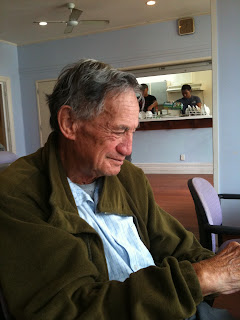When it comes to Alzheimers, it's not just the sufferer whose sanity and safety is of concern.
My sister came to stay at Mum’s place, as live in help with Dad. She came with her two youngest boys.
My sister came to stay at Mum’s place, as live in help with Dad. She came with her two youngest boys.
I’ll admit we weren’t sure this was a good move. Dad liked his house his way. Having extra people around, especially lively young boys, was bound to get up his nose. But mum was adamant everything would be fine. She can be a stubborn woman sometimes.
Mum was, and still is, involved in local community activities. I think she wanted someone around, someone who Dad knew, someone she was comfortable with, to take the attention off her and keep Dad happy and occupied while she did her own thing.
Sounds good in theory, but everybody has a life to live and that included my sister and her boys. Mum did enjoy their company and my sister did help take a load off in a lot of ways but, as time went on, Dad got worse in his acceptance of ‘others’ in the house. He started to view the boys rather negatively.
I’m not sure, actually, if he was jealous - they were interference to his direct access to mum. There were times, I'm sure, when he thought he should be the only one who was allowed her attention. Or whether he saw them as a reminder of his loss of control. Not only was his mind playing tricks on him but he no longer ruled his own home. The dynamics of who was in charge in the household had moved away from him, to Mum.
He thought he should be able to tell these boys what was what and they should listen. They eventually figured out it’s best to stay out of the way, which is hard to do when you all eat together. A TV room was created upstairs so they could get some peace and distance themselves from any craziness downstairs.
I give them their dues. They were living at mum's for a while and many times were able to take humour out of less than humourous situations. Rehua would recount, with a twinkle in his eye and a laugh, Poppa's getting mad over something he himself considered pointless, like having breakfast.
Dad- have your breakfast
Rehua- I've had breakfast
Dad - You have to have breakfast
Rehua - But I've already had breakfast.
Dad made lots more rumblings about having breakfast.
Rehua, from memory, went and had more breakfast, which for a growing boy suited him just fine.
Though some things could be taken with humour, I would hazard a guess that a childs patience and understanding of an angry Poppa wears thin eventually. Especially when the bad, seemingly irrational mood rears it's head too often.
Dad’s frustration with whatever was, or was not, going on in his head, made him angry. His Alzheimer’s, that’s what I’m blaming anyway, made him harder to deal with and pacify.
Apparently there comes a point where, if you can distract an Alzheimer’s sufferer long enough, they’ll forget what annoyed them and you can move them on to another activity. Dad was not at that point.
Once he got an idea in his head it could be difficult to shift him. It was as if the idea went round and around like a looped message with no stop button. And if you did manage to distract him, it was temporary. The recording would start again. It seemed the only thing that distracted him was a new looping message and we hadn’t figured out how to start one of those.
Usually Dad took his frustrations, when they built up, out on Mum. Shouting, mumbling, glaring and threatening. Eventually he could no longer contain himself and his anger spilled over to the boys.
It’s sad to think that the boys’ memories of Dad may well be little more than an old angry man.
It was time to move them out of the house, for their sanity and safety.
It’s sad to think that the boys’ memories of Dad may well be little more than an old angry man.
It was time to move them out of the house, for their sanity and safety.






